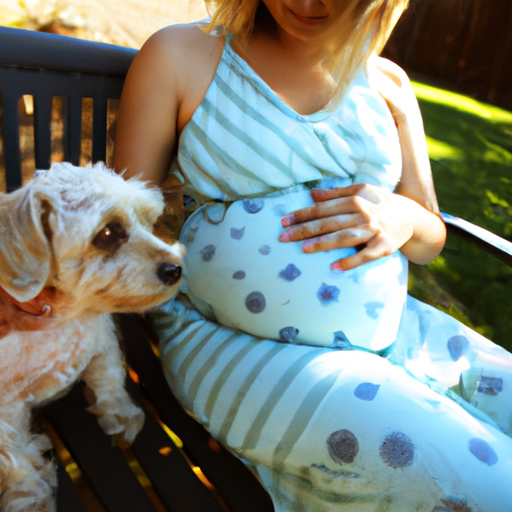While exciting, pregnancy can also be a time of uncertainty. As a caregiver, one of the questions you might be asking is how your furry companions will react. This article is here to guide you through understanding your dog’s behavior during your pregnancy journey.
H2: Understanding Your Dog’s Sensitivity
Dogs are incredibly perceptive creatures. They have a keen sense of smell and can pick up on subtle changes in your body’s natural scent that occur during pregnancy. This heightened sensitivity might cause them to act differently around you. It’s not unusual for dogs to become more protective or affectionate, or alternatively, seemingly indifferent or anxious.
- Increased Affection: Dogs may become more cuddly, wanting to stay close to you at all times.
- Protectiveness: You might notice your dog acting more protective, staying close to you, particularly when strangers are present.
- Anxiety/Indifference: Some dogs may seem disinterested or even anxious, as they could be picking up on your own pregnancy-induced anxieties.
H2: Changes in Your Dog’s Behavior
The changes in your dog’s behavior can vary greatly from dog to dog. Here are some possible changes you might observe:
- Increased Clinginess: Your dog might follow you around more than usual, wanting to stay in your company.
- Increased Vigilance: They might become more aware of your movements, reacting more to your physical changes.
- Change in Appetite: Some dogs may experience changes in their own eating habits, possibly reflecting your own shift in diet.
H2: Preparing Your Dog for the Arrival of the Baby
Preparing your dog for the arrival of the baby is crucial. Some steps you can take include:
- Gradual Introduction of Baby Items: Start by introducing your dog to baby items like cribs, strollers, and baby clothes. Allow them to sniff these items and get used to their presence.
- Training: Reinforce basic commands like ‘sit’, ‘stay’, and ‘leave it’. This will be helpful in managing your dog’s behavior once the baby arrives.
- Changes in Routine: Gradually introduce changes in routine that will occur after the baby’s arrival, such as different walk times or less attention.
| Steps | Description |
|---|---|
| Introduce Baby Items | Let your dog sniff and get familiar with baby items |
| Training | Reinforce basic commands |
| Change in Routine | Gradually shift your dog’s routine |
H2: Post-Birth Adjustments
Once the baby arrives, your dog will need time to adjust. Keep these points in mind:
- First Introduction: The first introduction between your dog and baby should be calm and controlled. Let your dog sniff the baby while on a leash.
- Positive Association: Associate the baby’s presence with positive experiences for your dog, like treats or praise.
- Monitor Interaction: Always supervise any interaction between your dog and the baby.
H2: FAQ
Q1: Can dogs sense pregnancy?
Yes, dogs can sense pregnancy due to their keen sense of smell and ability to detect hormonal changes in your body.
Q2: How can I help my dog adjust to the new baby?
Introduce your dog to baby items, reinforce training, and gradually change their routine before the baby arrives.
Q3: What should I do if my dog is acting aggressive during my pregnancy?
If your dog is showing signs of aggression, it’s best to seek professional help from a vet or a dog behaviorist.
Q4: Can I still play with my dog while I’m pregnant?
Absolutely. As long as the activities are safe and don’t put any strain on you, playing with your dog can be a great way to bond.
Q5: Should I keep my dog away from the baby?
While it’s important to supervise their interactions, it’s also crucial for your dog to get used to the baby’s presence. A gradual introduction is usually best.
Understanding your dog’s behavior during pregnancy can be a mix of joy and challenge. But with patience and preparation, you can ensure a smooth transition for everyone in your growing family.



